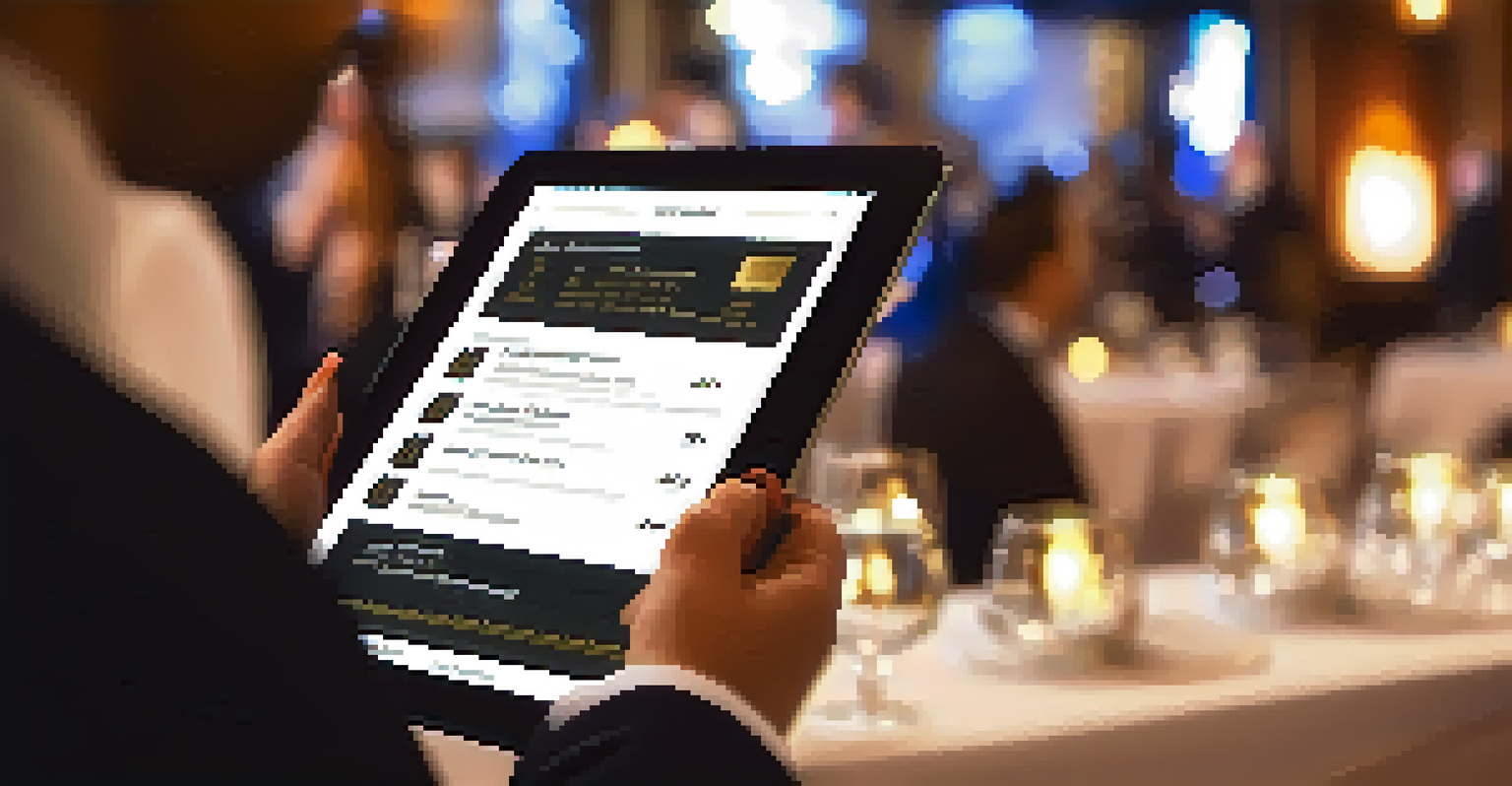Event Security: Ensuring Safety at High-End Gatherings

Understanding the Importance of Event Security
When it comes to high-end gatherings, security isn't just a checkbox; it's fundamental. The safety of guests and the integrity of the event are paramount, especially when dealing with high-profile attendees. Ensuring robust security measures can also protect the venue's reputation and avoid potential liabilities.
Security is not a product, but a process.
High-end events often attract attention, making them vulnerable to various security threats. From uninvited guests to potential theft, the stakes are high, and a proactive approach is crucial. Understanding the unique risks associated with upscale gatherings allows organizers to tailor their security plans effectively.
In today's world, where incidents can happen in a blink, investing in comprehensive event security is not just wise but necessary. It’s about creating an environment where guests feel safe and can enjoy their experience without worries. This sets the stage for a successful event.
Conducting a Thorough Risk Assessment
Before planning any security measures, conducting a thorough risk assessment is essential. This process involves identifying potential vulnerabilities, such as venue access points, and understanding the dynamics of the guest list. By analyzing these factors, organizers can craft a security plan that addresses specific threats.

Consider the type of event and the profile of attendees; for instance, a charity gala may attract different risks than a corporate conference. Engaging with security professionals who specialize in event safety can provide invaluable insights and help pinpoint areas of concern. This collaborative effort ensures that no stone is left unturned.
Event Security is Essential
Robust security measures are crucial for ensuring the safety of guests and the integrity of high-end events.
A comprehensive risk assessment isn’t a one-time task; it should be revisited regularly, especially as details about the event evolve. This ongoing evaluation helps in adapting security measures to meet any new challenges that arise, ultimately enhancing the safety of the gathering.
Choosing the Right Security Personnel
The selection of security personnel plays a critical role in the effectiveness of event security. Trained professionals who understand the nuances of high-end events can make all the difference. They should not only be capable of managing security threats but also adept at providing a welcoming presence for guests.
An ounce of prevention is worth a pound of cure.
When interviewing potential security teams, look for experience in similar events and ask for references. It’s essential to ensure that the staff is well-versed in conflict resolution and customer service. After all, the goal is to maintain a balance between safety and a positive atmosphere.
Moreover, clear communication between event organizers and security personnel is vital. Establishing protocols for various scenarios ensures that everyone is on the same page, allowing for a swift response if an issue arises. This level of preparation can significantly enhance the event's overall security.
Implementing Access Control Strategies
Access control is a cornerstone of effective event security, particularly for high-end gatherings. By managing who enters and exits the venue, organizers can significantly reduce risks. This can include measures such as ticket verification, guest lists, and wristband systems to distinguish attendees from unauthorized individuals.
Utilizing technology can further enhance access control. For instance, digital ticketing systems allow for real-time tracking of attendees and can alert security to any discrepancies. Additionally, employing security personnel at entry points ensures that access protocols are followed strictly.
Conduct Risk Assessments Regularly
Regularly revisiting risk assessments helps tailor security plans to address evolving threats at upscale gatherings.
Ultimately, robust access control not only deters potential threats but also provides peace of mind for guests. When attendees know that security is vigilant and effective, they are more likely to relax and enjoy the event. This contributes to the overall success of the gathering.
Establishing Emergency Protocols and Communication
In any event, having a clear set of emergency protocols is crucial. These procedures should outline steps for various scenarios, from medical emergencies to evacuation plans. By preparing for the unexpected, organizers can ensure a swift and effective response to any incidents that may arise.
Effective communication is key to implementing these protocols. All staff, including security personnel, should be familiar with emergency procedures and have access to communication tools. Regular briefings leading up to the event can help reinforce these protocols and ensure everyone knows their roles.
Moreover, it's beneficial to have a designated point person for emergencies, ensuring that decision-making is streamlined. This way, if a situation arises, there’s no confusion about who is in charge, leading to quicker resolutions and enhanced safety for all involved.
Utilizing Technology for Enhanced Security
In today's digital age, technology plays a pivotal role in enhancing event security. Surveillance cameras, drones, and advanced alarm systems can provide comprehensive coverage of the venue. These tools allow security personnel to monitor activities in real-time and respond quickly to any suspicious behavior.
Moreover, employing mobile apps for guest management can streamline check-ins and provide instant access to guest lists. This reduces wait times and enhances the overall experience for attendees. Additionally, alerts can be sent to security teams if any anomalies are detected, ensuring a proactive approach to safety.
Leverage Technology for Safety
Utilizing advanced technology, such as surveillance and mobile apps, enhances event security and streamlines guest management.
Integrating technology doesn't mean replacing human oversight; rather, it complements the efforts of security personnel. A well-rounded approach that combines technology with trained professionals leads to a more secure environment, allowing guests to focus on enjoying the event.
Post-Event Security Review and Feedback
After the event concludes, conducting a security review is essential. This process involves evaluating what worked well and identifying any areas for improvement. Gathering feedback from security personnel, staff, and attendees can provide valuable insights into the effectiveness of the security measures implemented.
Consider holding a debriefing session with the security team to discuss any incidents or challenges faced during the event. This collaborative reflection can highlight best practices and areas that need adjustment, ensuring that future events are even safer. It’s an opportunity to learn and adapt for the next high-end gathering.

Moreover, documenting these findings creates a reference for future events, allowing organizers to build a knowledge base over time. Continuous improvement in security protocols not only enhances safety but also fosters a culture of readiness and vigilance for all involved.